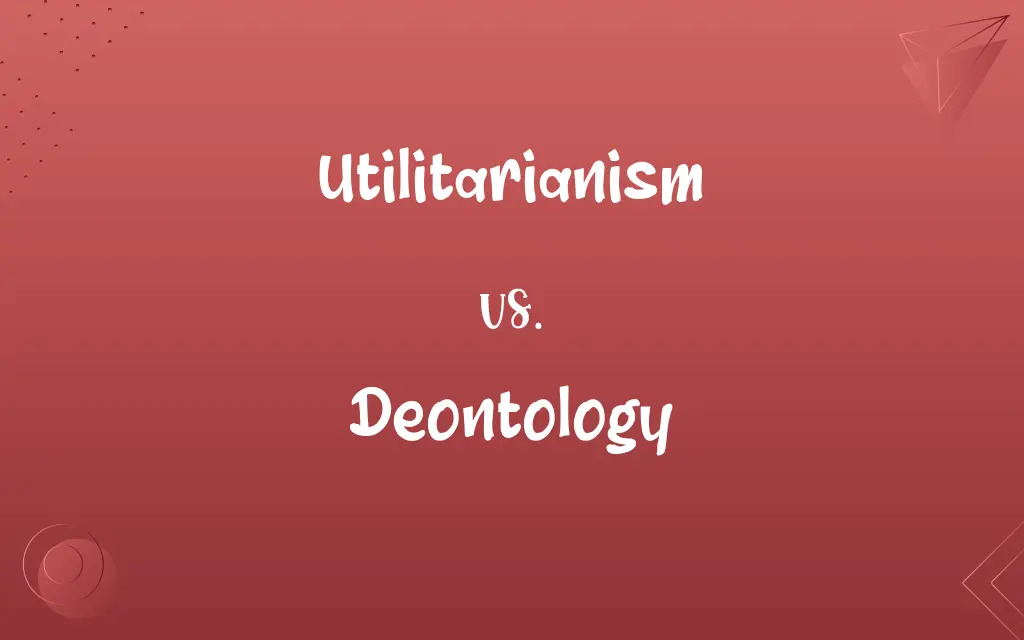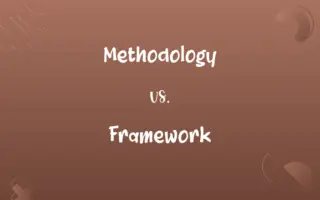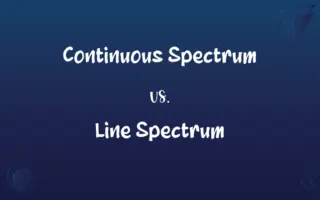Utilitarianism vs. Deontology: Know the Difference

By Shumaila Saeed || Published on January 3, 2024
Utilitarianism is a moral philosophy that emphasizes the greatest good for the greatest number; Deontology focuses on adherence to moral rules or duties regardless of the outcome.

Key Differences
Utilitarianism evaluates the morality of actions based on their outcomes, aiming for the greatest happiness for the most people. Deontology, in contrast, judges actions based on their adherence to moral rules or principles, regardless of the consequences.
Shumaila Saeed
Jan 03, 2024
In utilitarianism, the end result justifies the means, where the focus is on maximizing overall happiness or utility. Deontology, however, upholds that certain actions are inherently right or wrong, independent of their outcomes.
Shumaila Saeed
Jan 03, 2024
Utilitarianism often involves a cost-benefit analysis to determine the best course of action for the majority. Deontological ethics emphasize moral duties and rights, often derived from societal or religious norms, without considering the potential outcomes.
Shumaila Saeed
Jan 03, 2024
A utilitarian approach might justify a morally questionable action if it leads to a greater good. Deontology strictly adheres to ethical principles, even if it leads to less beneficial results.
Shumaila Saeed
Jan 03, 2024
Utilitarianism is flexible and context-dependent, adjusting to the situation to maximize happiness. Deontology is more rigid, holding steadfast to moral duties and rules regardless of the situation.
Shumaila Saeed
Jan 03, 2024
ADVERTISEMENT
Comparison Chart
Moral Focus
Outcome-based, greatest good for the most.
Rule-based, adherence to moral duties.
Shumaila Saeed
Jan 03, 2024
Decision Making
Cost-benefit analysis for maximum happiness.
Moral principles guide decisions, regardless of outcomes.
Shumaila Saeed
Jan 03, 2024
Flexibility
Situational, adapts to achieve best outcomes.
Rigid, consistent adherence to ethical rules.
Shumaila Saeed
Jan 03, 2024
Justification
Ends justify the means.
Morality of actions is inherent, not outcome-dependent.
Shumaila Saeed
Jan 03, 2024
Typical Applications
Public policy, economics.
Individual rights, legal systems.
Shumaila Saeed
Jan 03, 2024
ADVERTISEMENT
Utilitarianism and Deontology Definitions
Utilitarianism
A moral framework focusing on maximizing utility or happiness.
Utilitarianism guides healthcare policies towards the greatest benefit for patients.
Shumaila Saeed
Dec 19, 2023
Deontology
An ethical theory that actions are right or wrong based on rules.
Deontology would oppose lying, even if it results in a positive outcome.
Shumaila Saeed
Dec 19, 2023
Utilitarianism
A principle that evaluates actions by their utility in increasing happiness.
A utilitarian approach to business emphasizes the well-being of the majority of stakeholders.
Shumaila Saeed
Dec 19, 2023
Deontology
The belief in absolute moral duties and obligations.
A deontologist would argue that cheating is always wrong, irrespective of the circumstances.
Shumaila Saeed
Dec 19, 2023
Utilitarianism
The belief that the morality of an action depends on its consequences.
Utilitarianism might justify difficult choices during a crisis for the greater good.
Shumaila Saeed
Dec 19, 2023
ADVERTISEMENT
Deontology
A framework where actions are judged by their adherence to ethical principles.
Deontology stresses the importance of human rights in decision-making processes.
Shumaila Saeed
Dec 19, 2023
Utilitarianism
Ethical theory measuring actions by their outcomes.
In utilitarianism, a decision is considered ethical if it maximizes overall happiness.
Shumaila Saeed
Dec 19, 2023
Deontology
Moral philosophy focusing on duty and rule adherence.
In deontology, following the law is a moral imperative, regardless of personal beliefs.
Shumaila Saeed
Dec 19, 2023
Utilitarianism
A philosophy prioritizing the greatest good for the greatest number.
Utilitarianism would support a policy benefiting the majority, even if a minority is disadvantaged.
Shumaila Saeed
Dec 19, 2023
Deontology
Ethical approach emphasizing duty over results.
Deontology would uphold patient confidentiality as a moral duty, even if revealing information could have benefits.
Shumaila Saeed
Dec 19, 2023
Utilitarianism
The belief that the value of a thing or an action is determined by its utility.
Shumaila Saeed
Dec 13, 2023
Utilitarianism
The ethical theory proposed by Jeremy Bentham and James Mill that all action should be directed toward achieving the greatest happiness for the greatest number of people.
Shumaila Saeed
Dec 13, 2023
Deontology
The doctrine that ethical status of an action lies in its adherence to a set of rules.
Shumaila Saeed
Dec 13, 2023
Utilitarianism
The quality of being utilitarian
Housing of bleak utilitarianism.
Shumaila Saeed
Dec 13, 2023
Utilitarianism
(philosophy) A system of ethics based on the premise that something's value may be measured by its usefulness.
Shumaila Saeed
Dec 13, 2023
Deontology
(ethics) The normative ethical position that judges the morality of an action based on the action's adherence to rules or obligations rather than either the inherent goodness or the consequences of those actions.
Shumaila Saeed
Dec 13, 2023
Utilitarianism
(philosophy) The theory that action should be directed toward achieving the "greatest happiness for the greatest number of people" (hedonistic universalism), or one of various related theories.
Shumaila Saeed
Dec 13, 2023
Utilitarianism
The doctrine that the greatest happiness of the greatest number should be the end and aim of all social and political institutions.
Shumaila Saeed
Dec 13, 2023
Utilitarianism
The doctrine that virtue is founded in utility, or that virtue is defined and enforced by its tendency to promote the highest happiness of the universe.
Shumaila Saeed
Dec 13, 2023
Utilitarianism
The doctrine that utility is the sole standard of morality, so that the rectitude of an action is determined by its usefulness.
Shumaila Saeed
Dec 13, 2023
Utilitarianism
Doctrine that the useful is the good; especially as elaborated by Jeremy Bentham and James Mill; the aim was said to be the greatest happiness for the greatest number
Shumaila Saeed
Dec 13, 2023
Repeatedly Asked Queries
What is Deontology?
An ethical approach based on following set moral rules or duties.
Shumaila Saeed
Jan 03, 2024
Can Utilitarianism justify morally questionable actions?
Yes, if those actions result in greater overall good or happiness.
Shumaila Saeed
Jan 03, 2024
What are some criticisms of Utilitarianism?
It can overlook individual rights and justify harmful actions for greater good.
Shumaila Saeed
Jan 03, 2024
What is Utilitarianism?
A moral theory focusing on achieving the greatest good for the greatest number.
Shumaila Saeed
Jan 03, 2024
Can Utilitarianism be applied to public policy?
Yes, it's often used in policy-making to benefit the majority.
Shumaila Saeed
Jan 03, 2024
Does Utilitarianism focus on individual rights?
Not primarily, as it emphasizes collective happiness over individual rights.
Shumaila Saeed
Jan 03, 2024
How does Utilitarianism judge actions?
By their outcomes and the happiness or utility they produce.
Shumaila Saeed
Jan 03, 2024
What is the basis of moral judgment in Deontology?
The adherence to moral rules or duties, regardless of the consequences.
Shumaila Saeed
Jan 03, 2024
Does Deontology consider the consequences of actions?
No, it focuses on the morality of actions themselves based on rules.
Shumaila Saeed
Jan 03, 2024
How does Deontology influence legal systems?
It underscores the importance of laws and moral duties in legal judgments.
Shumaila Saeed
Jan 03, 2024
Is Utilitarianism suitable for individual moral dilemmas?
It's more suited for collective scenarios than individual ethics.
Shumaila Saeed
Jan 03, 2024
Is Utilitarianism flexible in its moral assessments?
Yes, it adapts to situations to maximize happiness or utility.
Shumaila Saeed
Jan 03, 2024
How rigid is Deontology in moral decision-making?
Very rigid, as it adheres strictly to ethical rules.
Shumaila Saeed
Jan 03, 2024
What are common critiques of Deontology?
It can lead to rigid or impractical decisions, ignoring potential harmful outcomes.
Shumaila Saeed
Jan 03, 2024
How does Utilitarianism view personal sacrifice for greater good?
It may view it as justifiable if it leads to greater overall happiness.
Shumaila Saeed
Jan 03, 2024
Does Deontology allow for exceptions in moral rules?
Generally, no, as it holds moral rules as absolute.
Shumaila Saeed
Jan 03, 2024
In Deontology, are intentions or outcomes more important?
Intentions and adherence to moral duties are more important.
Shumaila Saeed
Jan 03, 2024
Does Deontology allow for moral flexibility?
No, it's characterized by its moral steadfastness.
Shumaila Saeed
Jan 03, 2024
Does Utilitarianism support democracy?
Yes, as it aligns with the principle of the majority's welfare.
Shumaila Saeed
Jan 03, 2024
Can Deontology be inflexible in ethical dilemmas?
Yes, due to its strict adherence to moral rules.
Shumaila Saeed
Jan 03, 2024
Share this page
Link for your blog / website
HTML
Link to share via messenger
About Author
Written by
Shumaila SaeedShumaila Saeed, an expert content creator with 6 years of experience, specializes in distilling complex topics into easily digestible comparisons, shining a light on the nuances that both inform and educate readers with clarity and accuracy.








































































